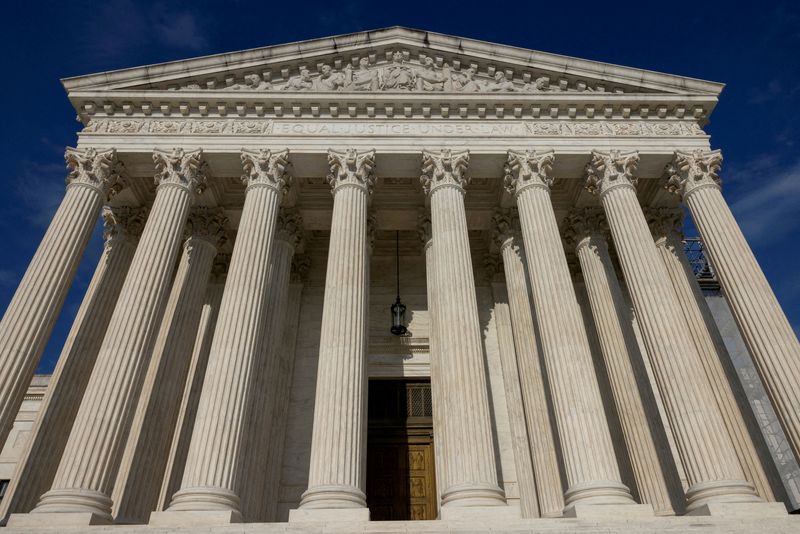By John Kruzel and Andrew Chung
WASHINGTON (Reuters) - The U.S. Supreme Court kicked off its new nine-month term on Monday with arguments in two cases and important disputes lined up for the coming days, weeks and months on guns, transgender rights, online pornography, workplace discrimination and more.
After a blockbuster previous term and action on a variety of cases during the summer on an emergency basis, the court opened its annual term, as is customary, on the first Monday of October. Its 6-3 conservative majority has continued to move U.S. law rightward in recent years.
The court has experienced internal tensions and scrutiny by many politicians and the public over some of its recent major rulings and ethics issues. But the nine justices appeared upbeat - some chatting casually and exchanging laughs - as they took to the bench before Chief Justice John Roberts turned to the term's first case.
The cases argued on Monday concerned a procedural dispute regarding unemployment compensation and the proper jurisdiction for class action litigation targeting pet food companies.
The court also rejected a series of appeals.
It declined to hear a bid by President Joe Biden's administration to enforce in Texas federal guidance requiring hospitals to perform abortions if needed to stabilize a patient's emergency medical condition.
It denied an Alabama fertility clinic's bid to avoid a wrongful death claim in a civil lawsuit over the destruction of a couple's frozen embryo in a case that has caused concern over the legal landscape for in vitro fertilization.
The justices opted not to hear a challenge by Elon Musk's social media platform X on free speech grounds of a judge's order that barred it from telling Donald Trump about Special Counsel Jack Smith's seizure of direct messages and other data associated with the former president's Twitter account.
The court denied appeals in two high-profile criminal cases.
Former R&B superstar R. Kelly's had appealed his 2022 federal conviction in Chicago on charges involving child pornography and luring underage girls to have sex with him. Stephen Calk, a Chicago bank's former CEO, had appealed his bribery conviction involving $16 million in risky loans to Paul Manafort, Trump's 2016 campaign chairman, in a bid to land a senior job in Trump's administration.
The justices also turned away former pharmaceutical company CEO Martin Shkreli's challenge to a $64.6 million financial penalty imposed by a judge after he raised a lifesaving drug's price by more than 4,000%.
'GHOST GUNS'
The first major case of the term comes on Tuesday when the justices hear arguments in the Biden administration's appeal of a judicial ruling against a U.S. regulation cracking down on "ghost guns," which can be bought online and quickly assembled at home while being difficult to trace.
On Wednesday, the justices hear arguments in Oklahoma death row inmate Richard Glossip's bid for a new trial after a state court refused to overturn his conviction in a murder-for-hire scheme despite potentially exculpatory evidence.
Other cases looming during the term include legal disputes over a Republican-backed ban in Tennessee on gender-affirming medical care for transgender minors, Mexico's lawsuit against U.S. gun companies accused of aiding the illegal trafficking of firearms and a Texas law requiring pornographic websites to verify the age of users to restrict access to minors.
The court also will consider whether workers from "majority backgrounds," such as white or heterosexual people, should have a higher bar to win workplace discrimination claims in a case involving a straight Ohio woman who said she lost her job post to a gay man and was passed over for a promotion in favor of a gay woman.
The court's last term ended on July 1 with its ruling, powered by the conservative justices, that recognized for the first time any form of presidential immunity from prosecution. The justices decided that Trump cannot be prosecuted for official actions he took that were within his constitutional powers as president.

The issue of ethics continues to simmer for the top U.S. judicial body. The court last year announced its first code of conduct for the justices amid revelations related to undisclosed luxury trips and other financial ties to wealthy benefactors, though it lacked any enforcement mechanism.
Trump is the Republican candidate facing Democratic rival Kamala Harris in the Nov. 5 U.S. presidential election. After losing to his Democratic opponent Biden in 2020, Trump made false claims of widespread voting fraud, as he and his allies pursued numerous legal challenges. The justices declined to entertain those challenges, but could be called upon again in the coming months to deal with election disputes.